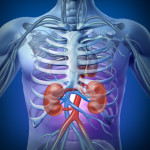Total Kidney Volume Measurement in Kidney Disease Progression

Autosomal dominant polycystic kidney disease (ADPKD) is an inherited condition caused by a genetic fault that disrupts normal development of the kidneys. The main function of the kidneys is to filter out waste products from the blood and release them from the body as urine, ADPKD compromises this process. The final stage of the disease…
Enhanced Contrast MRI for the Prevention of Renal Graft Rejection

Transplantation of an organ from a donor who differs genetically from the recipient induces an immune response that, if not controlled, may compromise the graft outcome. Chronic rejection is a major complication in renal transplantation and is currently the most prevalent cause of renal transplant failure. Current research is focused on developing new noninvasive imaging…
Stem Cells Contribute to Myocardial Repair after Renal Hypertension

The heart and the kidneys work very closely together: kidneys control blood pressure and filter the blood coming from the heart, eliminating the excess of chemicals and fluids in the form of urine. Several studies have shown that heart failure is a risk factor for renal disease and the two conditions may significantly impact each other…
The Impact of Coronary Artery Stenosis on Renal Injury

Coronary artery disease occurs when the arteries that supply blood to the heart become hardened and narrowed (stenosis) due to the accumulation of cholesterol and other fatty substances on their inner walls. The restriction in blood supply causes a shortage of oxygen and glucose to the heart that may not only impact the myocardial tissue,…
Dll4 Blockade and VEGF Inhibition in a Mouse Model of Kidney Cancer

Solid tumors require the growth of new blood vessels (angiogenesis) for oxygen and nutrient supply. This concept is nowadays solidly accepted and has spurred substantial efforts to develop anticancer therapeutics that interfere with tumor angiogenesis. Most current therapies are designed to block the vascular endothelial growth factor (VEGF) signaling pathway. VEGF’s normal function is to…
Plasma Copeptin Levels: a Biomarker of Renal Function

Copeptin is the C-terminal portion of the precursor of arginine vasopressin, a hormone involved in cyst growth in kidneys. This peptide is involved in renal pathways and function, and it is elevated in patients with the inherited autosomal dominant polycystic kidney disease, ADPKD. ADPKD often leads to the formation of cysts, as well as end…
 AnalyzeDirect
AnalyzeDirect